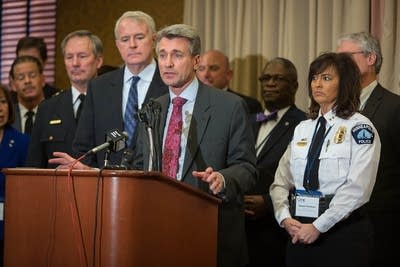Midwest gun summit focuses on gun violence, tightening regulations
Go Deeper.
Create an account or log in to save stories.
Like this?
Thanks for liking this story! We have added it to a list of your favorite stories.

Law enforcement officials and elected leaders from around the Midwest gathered Thursday to focus on ways to combat gun violence.
Presenters at the day-long conference in Minneapolis discussed enforcing existing laws better and creating new ones. They also talked about loosening federal restrictions that limit the gathering and sharing of data about gun crime.
Last month's massacre of 20 children at Sandy Hook Elementary School in Connecticut has inspired debate among local and national lawmakers about passing stricter gun laws. President Barack Obama has asked Vice President Joe Biden for legislative recommendations to combat gun violence.
Turn Up Your Support
MPR News helps you turn down the noise and build shared understanding. Turn up your support for this public resource and keep trusted journalism accessible to all.
• Infographic: Implementation of gun laws
• ATF report: Firearms tracing in Minnesota
Democratic Rep. Keith Ellison told participants at today's gun summit that more of his colleagues are expressing desire to make some changes.
"I think today, after Sandy Hook, we do have the political will. You're hearing members of Congress who used to talk about our sporting tradition, our gun-owning legacy, now say all those things are true, but there are sane, sensible things we can do to cut gun violence," Ellison said.
Ellison said he favors reinstating the assault weapons ban which expired in 2004, getting rid of magazines that allow people to fire dozens of bullets without reloading, and tightening rules which allow gun sales without background checks.

Minneapolis Mayor R.T. Rybak, who co-organized the summit, said he would like to see the federal government pass stricter gun laws. He would also like the federal government to make it easier for the public to access information about where guns used in crimes come from.
"When I'm at a murder scene and I'm standing with a mother over the body of her dead child and she deserves to know where that gun came from, it's wrong for a congressman in Washington to somehow believe that they should prevent that mother from having that information," Rybak said.
Rybak is referring to a set of restrictions known as the Tiahrt Amendments, named after former Rep. Todd Tiahrt, R-Kansas. Since 2003, the Tiahrt Amendments have been attached to funding for the Bureau of Alcohol, Tobacco, Firearms and Explosives. Among other things, the Tiahrt Amendments restrict the ATF from spending any of its money on sharing detailed gun trace data with the public.
The amendments are not designed to prevent police officers from learning where crime guns from. Milwaukee Police Chief Ed Flynn said, however, gun rights lobbyists helped craft a law in his state that makes it difficult for his department to investigate crimes involving people who have permits to carry firearms.
"The statute expressly forbids the police department keeping records of our involvement in crimes with people who have permits. We're not allowed to know, what we know," Flynn said.

The conference included state and federal law enforcement officers, as well as mayors from cities big and small from around the region. But it did not appear to include any vocal opponents of new gun control laws.
Rep. Tony Cornish, R-Good Thunder and chief of police of Lake Crystal. said new or more restrictive gun laws won't stop criminals from using guns to hurt people.
"What we need to do is allow people to defend themselves. Arm guards, arm teachers and stop talking about disarming the common citizen," Cornish said.
Cornish favors allowing teachers to carry guns in schools. He said he is not in favor of making gun trace data available to the public. Corish said that could lead to protesters picketing in front of gun stores, which he likens to protesting in front of a dealership that sold the car that was used to run someone over.
Rybak said he will travel to Washington. D.C. next week to lobby for tighter gun control laws. That's also when Vice President Biden is expected to announce his gun control recommendations. Biden said today that while he had not finalized his recommendations, a consensus was emerging over banning assault weapons and high-capacity ammunition magazines as well as tightening background checks.
Dear reader,
Political debates with family or friends can get heated. But what if there was a way to handle them better?
You can learn how to have civil political conversations with our new e-book!
Download our free e-book, Talking Sense: Have Hard Political Conversations, Better, and learn how to talk without the tension.







